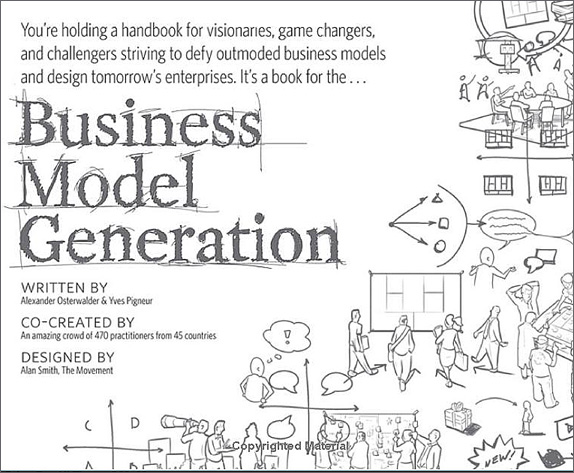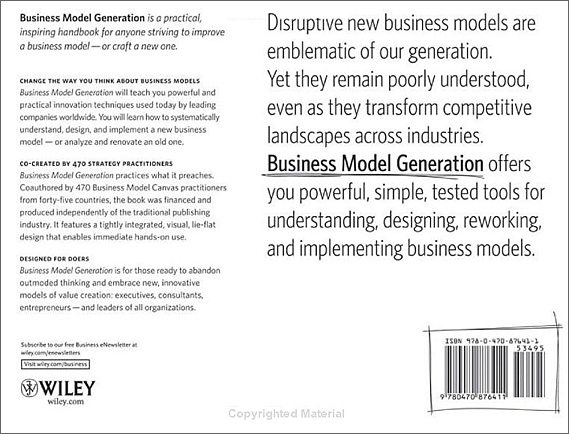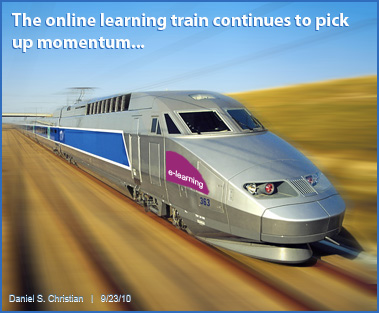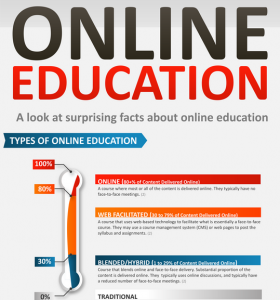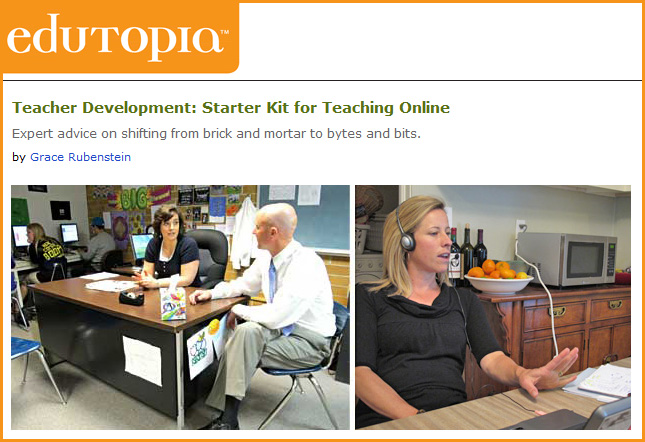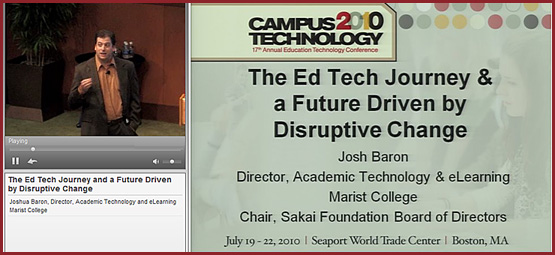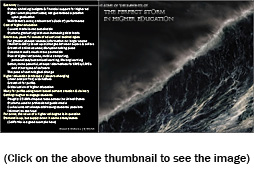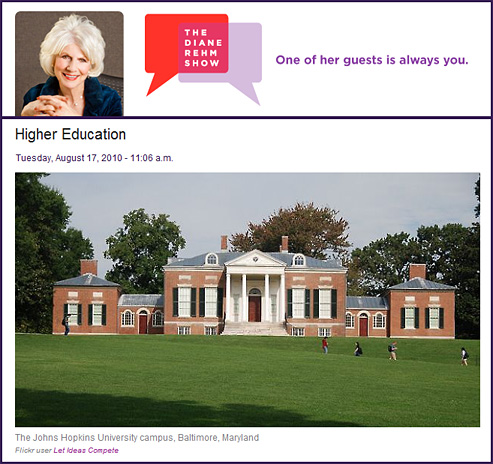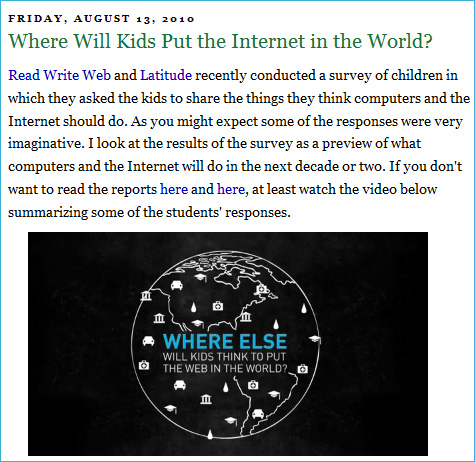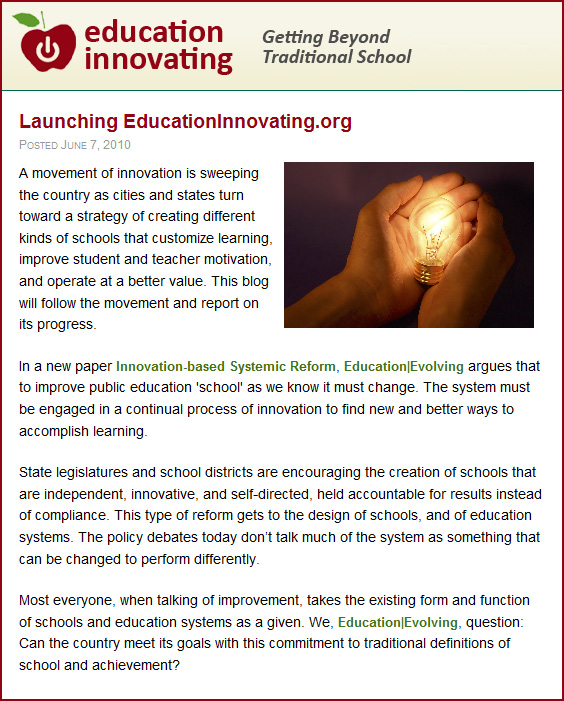Blockbuster Bankruptcy: A Decade of Decline — from FastCompany.com by Austin Carr
Surprising facts about online education — from DegreeScout.com [via dontwasteyourtime.co.uk]
Online education is quickly becoming a prominent and important piece of the education pie in the United States. The explosive growth of this segment of education, even during a recession, is nothing short of spectacular. It is becoming clear that there is a fundamental shift in how Americans are being educated after high school. The flexibility, lower cost, and variety of choice are just some of the reasons that online education is growing at its current pace. The following infographic will give you a better idea of the scope, impact, and future of online education. Enjoy!
Also see:
The Khan Academy now on iTunesU [via openculture.com]
The Khan Academy, which already has a robust presence on YouTube and the web, now opens up shop on iTunesU. This gives students yet another way to access 1800+ video tutorials that teach the ins-and-outs of algebra, geometry, trigonometry, calculus, statistics, finance, physics, economics and more. The lectures, all taped and presented by Sal Khan, a Harvard MBA and former hedge fund manager, are watched some 70,000 times per day. And, with this new distribution channel, the numbers only promise to move higher. For more on The Khan Academy, see this August CNN piece. To download iTunes, click …
Khan Academy content available for download [via M. Guhlin]
At the start of the year, a Math teacher specialist pulled me aside and asked me, “How come all these awesome videos are blocked?” As we tried to access the different videos, I finally pulled up the web site–The Khan Academy–and noticed that the majority of the content was located at …
Teacher Development: Starter Kit for Teaching Online — from Edutopia.org by Grace Rubenstein
Expert advice on shifting from brick and mortar to bytes and bits.
.
Bellevue College launches program to teach educators about online learning — — [via Ray Schroeder] by the Bellevue Reporter
Bellevue College is launching a new “eLearning for Educators” professional development program for K-12 and college teachers who wish to bring the benefits of online learning to their students. “eLearning” is a broad term that includes all forms of teaching and learning that are supported or enhanced by digital technology. The new program at the college teaches educators how to integrate new instructional technology into their courses, whether they teach in a traditional “in-class” venue, a fully online setting or in a hybrid format that blends the two …
Students Are Motivated to Take Online Courses — [via Ray Schroeder] by edreformer.com via e-learning news blog
Susan Patrick, President of iNACOL writes into the Chicago Tribune to voice her support for online learning initiatives in Chicago Public Schools. She finishes off her letter with a valid point, that students actually are motivated to take online courses, because they like it, and because online better influences their learning. What’s more, students want to learn online: a national study showed 40 percent of middle and high school students want to take online courses. Despite what critics say, there is no evidence that children in online or hybrid classes are any less socially adjusted than those children who attend brick-and-mortar, traditional …
Also relevant:
- High Speed Video Adds Collaboration to Enterprise Grade Video Communications and Desktop-Telepresence Software Platform — from indianweb2.com by Vardaan
Are we approaching a mutation in higher education? — from changinghighereducation.com by Lloyd Armstrong, University Professor and Provost Emeritus at the University of Southern California
As mass consumption gives way to the wants of individuals, a historic transition in capitalism is unfolding.
So begins an interesting article in a recent McKinsey Quarterly written by Shoshana Zuboff. Zuboff’s premise is straightforward:
Every century or so, fundamental changes in the nature of consumption create new demand patterns that existing enterprises can’t meet. When a majority of people want things that remain priced at a premium under the old institutional regime—a condition I call the “premium puzzle”—the ground becomes extremely fertile for wholly new classes of competitors that can fulfill the new demands at an affordable price.
The Ed Tech Journey and a Future Driven by Disruptive Change — from Campus Technology.com by Mary Grush
Teaching and learning in higher ed have advanced incrementally alongside rapid changes in technology. Is it time for some radical shifts?
As the closing keynote speaker at Campus Technology 2010, Josh Baron, director of academic technology and e-learning at Marist College (NY) and chair of the Sakai Foundation board of directors, scanned emerging technologies and trends to identify the future potential for fundamental, revolutionary change in higher education. The following is based on excerpts from his hour-long talk. (A recording of Baron’s keynote is available at campustechnology.com/summer10; click on Recordings. Or click below graphic.)
.
Web collaboration trends — from The Webinar blog by Ken Molay
Intercall put out a press release today summarizing results from a survey of college students about watching webcast courses. I have to admit I was surprised by how widespread some of the behavior characteristics are… I knew that streaming courses over the web was done, but I didn’t realize how many students relied on it.
Consider that 48 percent of students said they take multiple classes scheduled for the same time! That’s a far cry from my college days, when I would painstakingly juggle which classes to sign up for based on whether I could get from one side of campus to the other in time. 78 percent of students said that professors had made courses available online, either live or on demand. What do you think these students are going to expect of communications when they enter the workforce? Will they agree to attend multiple product briefings or team meetings scheduled for the same time because they figure they can watch the webcast recording later?
Excerpt:
The survey polled college students ages 18 to 25 about their attitudes and behaviors towards streamed video content of their college courses. Additional findings from the survey include:
- Use of streaming is on the rise — Eight in ten students (78 percent) report that professors have made lectures available either by live video feed or posting a videotaped lecture for students to access online. Nearly a third (30 percent) say their professors use web streaming frequently.
- In two places at once — Almost half (48 percent) of students take multiple classes scheduled for the same time which was virtually impossible before streaming. Also, 63 percent “attend” classes even though they are in reality, out of town.
- Juggling jobs and studies — Streaming helps those students who are working their way through school: 47 percent say having content available to view at a later time allows them to work more hours at their job.
- Students are taking control over the way they learn — Nearly 60 percent say streaming video allows them to spend more time studying by themselves and grasp concepts better because they can go at their own pace (44 percent).
- We want our streaming! — More than two-thirds (67 percent) of students said they wish more of their professors used streaming and the majority (85 percent) say they would find it helpful to have their classes live streamed or video posted online.
- Parents just don’t understand — A third of U.S. students say that their parents or guardians would be very upset to know how often they actually attend classes in person because they “attend” by watching video of their course online. However, the majority of respondents report that streaming improves students’ performance and helps them balance school with work.
“While I still haven’t given up on state government’s role in supporting public higher education,” [Boise State University President Bob Kustra] said, “with each passing year I see more clearly that the funding of higher education as we experienced it in the past will not be replicated in future years.” Boise State needs to re-examine the business model universities use and construct a new one, according to Kustra.
BlackBerry crumble: Why RIM is in trouble — from cnn.com
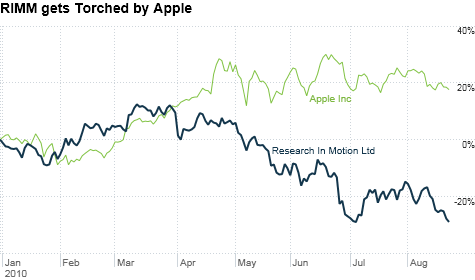
With that in mind, some worry that there are eerie similarities between Research in Motion and Palm, the once-hot smartphone maker that failed to keep up with Apple, Research in Motion and others.
After Palm’s Pre phone flopped, the company’s stock took a nasty dive and some feared that it may not have enough cash to make it for the long-term. Hewlett-Packard finally stepped in and agreed to buy the company earlier this year, however.
Chris Bulkey, an analyst with Technology Research Group in Narberth, Pa., said Research in Motion could suffer the same fate. For now, the company’s sales and profits are still growing, but the pace is slowing.
And without a hot product on the horizon, Bulkey, who has a “sell” rating on the stock, said it’s hard to envision a bright future for Research in Motion.
“Research in Motion sells a commoditized product. There is margin pressure and the revenue growth is weak,” Bulkey said. “Over the long-term, they may need someone to bail them out like HP did with Palm if they see value in the technology.”
From DSC:
Along these lines…I recently received a call from a colleague who mentioned that Novell has recently been pushing their new videoconferencing product…hmmm…WAAAAAYYY too late to the game in my opinion. Here is a company who could have dominated the web-based videoconferencing and collaboration space — had they been able to innovate better and to think just a tad outside their normal LAN box.
If what we are offering in higher ed is a commodity…we had better look out! Times ahead will be very rough indeed. That’s why I have been preaching innovation, change, the dangers of the status quo, planning for the “Forthcoming Walmart of Education” and trying to create a strategy whereby we are not a commodity — as we all must bring something unique and compelling to the table.
.
Two professors examine the American higher education system and explain how students and parents can get the most for their money.
Andrew Hacker
Professor of Political Science at Queens College, New York, and co-author of “Higher Education? How Colleges Are Wasting Our Money and Failing Our Kids – And What We Can Do About It”
Mark Taylor
Chair of the Department of Religion at Columbia University, professor of philosophy of religion at Union Theological Seminary, and professor emeritus of humanities at Williams College. His latest book is titled, “Crisis on Campus: A Bold Plan for Reforming our Colleges and Universities.”












